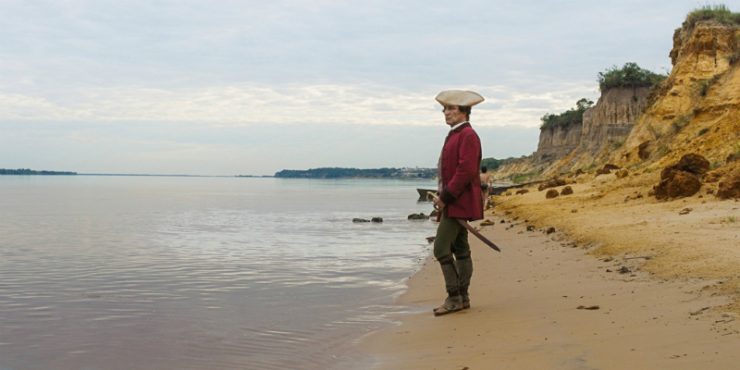On the shores of Colonial South America, the men of the Spanish Empire sit within the torturous humidity, surrounded by bitter indigenous groups and mysterious diseases, waiting for news from home. One of those men, Don Diego de Zama (played with astonishing anguish by Daniel Giménez Cacho) has been waiting his entire life. Being born in the Americas has placed him in the back of the line, far away from a wife, a family and a home continent that he has never even seen. Don Diego, a Spanish corregidor, watches as many pass him by, get recommendations from local governors for trips to Spain. Desperate, Zama does everything that he can think of. He implicates an author, tries to barter the birth of his bastard child in exchange for a sympathetic transfer, he even goes on a dangerous search for the region’s most dangerous man, all in the hopes of finally grasping the reality within his dreams. The film is equal parts austere and absurd, chronicling the social decline of a man who wishes to reach a place he’s never had stake to claim. Animals waltz in and out of shots for pure aesthetic, and a hyperventilating score ratchets up the tension as Zama becomes further ensnared in his prison.
Writer-Director Lucrecia Martel crafts Zama as an incredibly dire, unsettling film. Zama is haunted by the ethereal ghosts of colonialism and slavery, his relationship with the region becoming more and more hostile. The film’s shot list – a mixture of intoxicating coastal vistas and claustrophobic awkward viewpoints where characters are often partially or completely out of frame – is a brilliant display of masterful visual storytelling, tying the harrowing details of the period into a story of a person trying to distance himself (both physically and emotionally) from those details as much as he can. As the film soldiers on, Zama loses friends and standing, his chances at departure dwindling further and further from his grasp. And yet, his hope continues, even as his spirit is crushed, because what else does he have? I wish I felt more confident in what Martel’s astonishing imagery was meant to represent or simply better understood the more nuanced details of the film’s plot. Zama’s relationship with the region’s much-mythologized bogeyman, Vicuña Porto, was both striking and obscure – it was one of many pieces I struggled to fit together. But Zama is a film that will grow in stature over time, its mood and vision bringing the viewer to their knees. This is a must-watch film that is better to be seen than understood.
Written for the Screen and Directed by Lucrecia Martel










